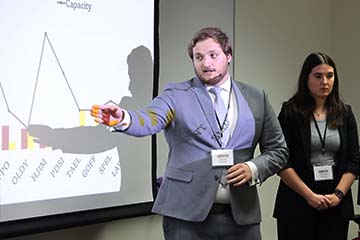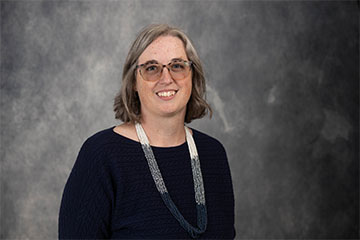Don’t be haunted by application fees! Undergraduate students can apply for free all month long.
Apply NowThe diversity of how brains work
Psychologist discusses the difference between neurodivergent and neurotypical
April is Autism Acceptance Month, a globally recognized time set aside to raise awareness and promote acceptance of autism specifically and the concept of neurodiversity generally. It’s also a time to recognize people among us whose brains process things differently.
Allison Peart, a psychology department faculty member and director of Central Michigan University’s Psychological Training and Consultation Center and the Autism Assessment Evaluation Center, shared her expertise on neurodiversity, the whole range of how people’s brains work. Peart also recently recorded an episode of CMU's podcast The Search Bar about autism.
Q. What is the relationship between the terms neurodivergent, neurodiversity, and neurotypical?
These three terms are all used to describe how our brains work. Neurotypical is usually used to describe someone whose brain functions in a "typical" way, while neurodivergent means an individual's brain functions differently than a "typical" brain does. Neurodiversity is a more general term that suggests everyone's brains work somewhat differently or uniquely. Some folks refer to neurodiversity as a spectrum that encompasses the entire range of brain differences.
Q. What are the most common forms of neurodivergence?
Some of the most common neurodivergent conditions are Attention-Deficit/Hyperactivity Disorder (ADHD), Autism Spectrum Disorder (ASD) and Specific Learning Disorder (SLD). These are neurodevelopmental disorders, meaning that they are associated with differences in brain development.
Assessments for neurodivergent conditions (e.g., ADHD, ASD, SLD) vary based on many factors. Oftentimes, they involve working with a healthcare professional (e.g., psychologist, psychiatrist) in a clinical setting, such as a mental health practice or a hospital. The healthcare professionals use a variety of assessment methods, including reviewing school and/or medical records, interviewing the individual and/or others who know them well (e.g., family members), observing the individual's behavior and directly testing the individual's skills. There are oftentimes questionnaires that the individual and/or others who know them well will complete about their social, emotional and/or behavioral functioning. Information from these different methods is then combined, and a diagnosis is made if the information aligns with the diagnostic criteria.
Q. How is someone with neurodivergence diagnosed?
Assessments for neurodivergent conditions (e.g., ADHD, ASD, SLD) vary based on many factors. Oftentimes, they involve working with a healthcare professional (e.g., psychologist, psychiatrist) in a clinical setting, such as a mental health practice or a hospital. The healthcare professionals use a variety of assessment methods, including reviewing school and/or medical records, interviewing the individual and/or others who know them well (e.g., family members), observing the individual's behavior and directly testing the individual's skills. There are oftentimes questionnaires that the individual and/or others who know them well will complete about their social, emotional and/or behavioral functioning. Information from these different methods is then combined, and a diagnosis is made if the information aligns with the diagnostic criteria.
Q. What strengths are associated with neurodivergence?
There are many strengths of neurodivergence, which are often overlooked by individuals who rely on a medical model rather than a strengths-based model when working with neurodivergent individuals. The ability to hyperfocus, meaning to intensely fixate on something, may lead to increased productivity and/or high levels of knowledge about particular topics. Another strength that is often associated with neurodivergence is demonstrating a high level of attention to detail, which may help when it comes to completing highly detailed work or tasks that must be completed a particular way.
Q. What should someone do if they think they might be neurodivergent?
There isn't a right or wrong way to navigate this process. For example, some individuals may feel strongly about pursuing a formal evaluation to determine whether they have a particular neurodivergent condition, while others may not see the need. If someone wants to undergo an evaluation to determine whether they meet the diagnostic criteria for a neurodivergent condition, they should reach out to local healthcare professionals, such as psychologists and psychiatrists, to ask whether they conduct these evaluations and whether they accept the individual's insurance. Regardless of whether an individual chooses to be evaluated, individuals often find it helpful to get connected with someone whom they can talk to about their neurodivergence. This may be a therapist or an advocacy or support group of other neurodivergent individuals.
About Allison Peart

Allison Peart is a professor in psychology department and clinical director of the Psychological Training and Consultation Center at Central Michigan University. She also oversees the Autism Assessment Evaluation Center within the Carls Center for Clinical Care and Education.
Peart received her master’s and doctorate in psychology from CMU in 2020 and 2023, respectively. She received her bachelor’s in psychology from the University of Michigan in 2018. She completed her APA-accredited predoctoral internship at the Munroe-Meyer Institute within the University of Nebraska Medical Center in Omaha. Her research predominantly focuses on school-based behavioral interventions.




